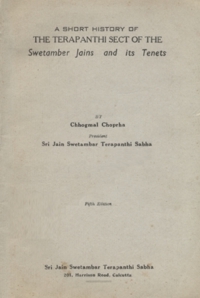Speech delivered by Dr. Hermann Jacobi, M.A., PhD, of Bonn (Germany) on a visit to the Eighth Acharya of the Terapanthi Swetambar Jains, at Ladnun (Marwar) on 9th March, 1914.
Gentlemen,
I have now been three days in your town of Ladnun where I have been invited by the Jain Swetambari Terapanthi Community. I have enjoyed your great hospitality and I gladly avail myself of this opportunity to offer my cordial thanks to all who have come from near and distant places to meet me and who have vied with each other to make my stay in Ladnun a very pleasant and successful one. As I am told, I am the first European who has come to this town. May my visit, which has given so much satisfaction to me, and I hope, same to you, be an auspicious omen - a Mangala - for the friendly relation of the two races European and Indian.
I have been much interested in seeing your town with its splendid mansions and its fort with its historical memories and I shall not forget what has made so deep an impression on my mind. But the purpose for which I came and for which I was expressly invited to see your Pujyaji Maharaj and to collect information about the Jain Swetambari Terapanthi sect at the fountain head. In tins respect my visit was a full success.
I had some lengthy conversations with the Pujyaji Maharaj Sree Kaluramji who has most kindly shown and explained to me important passages on the Jain Sastras and enlightened me besides on many important points of interest, e. g., on the very strict rules of conduct to which the J. S. Terapanthi Sadhus must comply. And other gentlemen too have taken much trouble to inform me about the organisation of the J. S. Terapanthis, the working of which I have observed with my own eyes when I was present at the meeting of Sadhus and Mahasatis, of Shravaks and Shravikas under the guidance of your venerable head Guru, the Pujyaji Maharaj. It so happened that during my presence in Ladnun, the ordination of a man and his wife took place and I could witness the ceremony. Moreover on this very morning I have been present at a Śikṣā (शिक्षा) (i.e., the public examination of Sadhus). This I have been able to form a correct idea of the instructions and the religious life of the J. S. Terapanthis, about whom so little is known to the public in Europe and America. I may say, that thanks to the readiness of all to give me information, the purpose of my visit to Ladnun has been entirely fulfilled and that, I am now in a position, wherever an occasion offers, to speak with authority about the J. S. Terapanthis and their religion.
Before I conclude, I should like to make another remark. I have been told that the Terapanthis like the other sections of the Jain Church make efforts to improve the education of their youth. Now I would direct your attention to one point. I have met many Jains who had a full command of the English language but very few who have mastered even the elements of Sanskrit, the learned language of their own country. In my opinion, which I hope is shared by most of you, it should be the duty of every educated Jain to learn Sanskrit, not to pass an examination in that language, but to be able to read the works of their own literature. Of course for that purpose, you should not study Sanskrit as the Pandits teach it. The niceties of grammar are not wanted by one, who learns Sanskrit, to read books written in an easy style. What is wanted is the knowledge of the rudiments of grammar, declination, the verbal system and compounds, and the principal means, to reach the aim will be to read easy texts, not difficult ones; and to read extensively and not only small portions and selected specimens, it will be necessary to fix the method to be employed in the schools to be founded. You must settle these principles in conjunction with all the sections of Jains. Swetambars and Digambars, Sthanakbasins and Terapanthis must forget their quarrels and devise together the plan for the higher Jain education. By united efforts only, you will be able to come to satisfactory results.
And now, Gentlemen, I must conclude with deeply felt thanks for your liberal hospitality, for the cordial welcome you gave me and for so many acts of kindness which I never shall forget. So I say farewell to you and your community. May it continue to prosper and progress for all times and in all places.
Ladnun, 9-3-1914
(Sd.) Hermann Jacobi
 Chhogmal Choprha
Chhogmal Choprha
